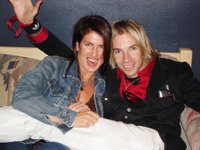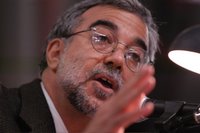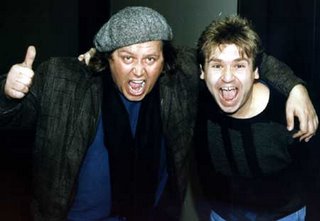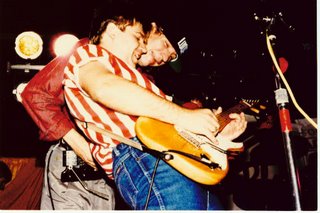Cara Caravieu
I originally interviewed Cara back in February of 2007 and updated her status in May of this year, but just a few months after I did so, she got a brand new gig--midday host at WTMX. I asked her how things were going in the new job...
 Cara: The old saying "when one door closes, another opens" is so true! I am so happy working for Bonneville hosting middays at WTMX. I love coming on after Eric & Kathy, a morning show I've long listened to and admire even more strongly now that I've witnessed first hand the mass amount of work that goes into it. And to be back working for Bonneville, the best company in the broadcasting industry, is awesome!
Cara: The old saying "when one door closes, another opens" is so true! I am so happy working for Bonneville hosting middays at WTMX. I love coming on after Eric & Kathy, a morning show I've long listened to and admire even more strongly now that I've witnessed first hand the mass amount of work that goes into it. And to be back working for Bonneville, the best company in the broadcasting industry, is awesome! I worked really hard to earn this position - unlike other radio stations that claim they are doing a nationwide search but ultimately promote from within rather quickly, WTMX truly did take months deciding on who would fill the midday slot because they really were looking all over the country. Since I was competing with a nationwide search I put together quite a unique demo package and even designed a specific website just for the job including a power-point presentation about why they should hire me (taking the time to learn HTML really paid off). When the position was finally offered to me, I was absolutely thrilled. My bosses didn't choose me just for my on air presence - they also recognize my ability to harness the internet and are also utilizing my talents in many ways in that arena, which I truly enjoy. Check out my Mix web page "Cara's Connection" for a constantly growing amount of content.
Besides hosting middays at WTMX, I continue to host my Cara's Basement podcast, provide artist interviews for The Chicago Music Guide, supply content for the NBC Chicago website, and co-host a podcast with my husband Bill Busch called Fitness From The Inside Out. I'm really busy but I enjoy everything I'm doing so it's a pleasure.
Life is very good right now and I'm thankful every day for not only having a full-time job but having one that I love so much. Especially in this crazy economy. I'm well aware of the many talented broadcasters who are currently "on the beach" and my advice to them is to take this opportunity to learn something new and enjoy some much needed R&R while you have the chance. I consider my time in between gigs a blessing.
UPDATED 5/31/08

Cara Carriveau is a personality on WTMX Radio, but she does so much more than that. When I interviewed her last year, she was just getting her Cara's Basement podcast started. I even appeared as a guest on that show last summer (photo). I recently caught up with her and asked her if she would mind updating her Chicago Radio Spotlight interview...
Cara: First, thanks for the original interview. It's always fun to chat with you.
At the time of that interview I had just begun to work part time at 101.9 WTMX in Chicago. You can hear me on The Mix quite bit - view my on-air schedule at www.myspace.com/caracarriveau.
I had just started my podcast Cara's Basement when we last spoke - wow, has it grown! I've interviewed Linkin Park, JY from Styx, Rik Emmett from Triumph, Stephen Pearcy from RATT, Mick Jones from Foreigner and many other fascinating entertainers (including an author named Rick Kaempfer). Some big names are on tap for future episodes and I'm also interviewing up & coming artists because I think it's fun to talk with people working towards their dreams and it's great exposure for them. Cara's Basement is now featured on 1Club.fm, a popular music portal online. I also do artist interviews for The Chicago Music Guide - I've interviewed Alanis Morissette, Against Me!, Ankla, Taylor Dayne and many others for them.
Besides my own podcast, I also co-host my husband Bill Busch's podcast Fitness From The Inside Out. My voiceover business Cara Communications is keeping me busy - besides voicing a ton of phone systems worldwide, commercials & narrations I now do radio station imaging including rocker WIHN in Bloomington, Illinois. I'm a member of the NBC5 Street Team, a select group of bloggers/podcasters in Chicago. I've definitely embraced new media - you can find me all over the internet - youtube, twitter, facebook, myspace, etc. and I've taught myself html so I'm doing all of my own websites. You can often find me emceeing charity concerts throughout Chicago - I have one coming up at the Double Door July 5. A few other broadcasting projects are in the works that I can't divulge details about yet, but I will say that I'm very excited!
The biggest accomplishment in the past few years, though, has been the remarkable experience of raising my kids. I've been able to chaperone school events for my daughter which I never could do when I worked fulltime. My son Sam is now 3 and is such a joy to be around. As busy as I am with my own projects, my husband and children are by far my top priority.
**********************
Now here is the original interview...

Cara Carriveau rose to fame in Chicago on the legendary rock station: The Loop. She recently moved down the radio dial to 101.9 FM, The Mix.
Radio-ography:
I got my first full-time radio job in 1986 at 95.3 WCFX/Clare, Michigan, working nights while a college student at CMU. I moved to Chicago in 1989 to host Overnights at 103.9 WABT "The Wabbit"/Dundee. I quickly moved up to Evenings, then Middays and eventually became Program Director 1991-1995. I made my first jump to 97.9 WLUP "The Loop"/Chicago in 1995 as News Anchor/Sidekick/Traffic Reporter with Kevin Matthews. I was actually employed by Shadow Traffic at the time as Program Director/Traffic & News Reporter - and I wound up doing news or traffic reports on practically every Chicagoland radio frequency. I was Morning News Anchor/Sidekick, Midday Host, and Promotion Director (yes, all at the same time!) at 95.1 WIIL "95 Will Rock"/Kenosha 1995-1996. I was an On Air Personality at 103.5 WRCX "Rock 103.5"/Chicago 1996-1998, then after they changed formats I filled in Middays & Afternoons at 101.9 WTMX "The Mix"/Chicago for a few weeks in December, 1998. I returned to 97.9 WLUP "The Loop"/Chicago in January, 1999 hosting Evenings, then promoted to Middays in 2000. I remained at WLUP until October, 2006. I've been back on air at 101.9 WTMX "The Mix" since November, 2006.
I have also been the "phone voice" for the Rosemont Theatre and Allstate Arena since 1995, and if you ever go to a show at the Rosemont Theatre you'll hear my voice welcoming you in the lobby. I am very excited about my new podcast, Cara's Basement, featuring interviews with all kinds of people but focusing on performance artists. (My first guest is comedian/radio personality Dobie Maxwell.)
I also do independent voice-work from my home studio for my own company, Cara Communications. Anyone who would like to keep track of where & when to hear me on the radio or online should become my MySpace friend at: www.MySpace.com/CaraCarriveau and www.MySpace.com/CarasBasement.
Rick: Recently you were in the middle of a media controversy because of a letter you sent to Chicago Sun-Times columnist Robert Feder lamenting the unemployment of great radio stars. The Loop fired you for writing that letter. What did you learn about yourself and/or the business from that experience?
 Cara: I lamented the unemployment of radio personalities even more when I suddenly became one! The first thing I learned was how printed words can easily be misinterpreted. It's another reason I love radio, because being able to add inflection certainly helps convey your intended message much more clearly. I also learned that what I wrote couldn't be any more true. My letter and subsequent termination got national coverage and I received several hundred messages from radio listeners & non-listeners, friends, colleagues and even radio industry employees I've never met. The letter certainly struck a chord with many disenchanted radio listeners. The vast outpouring of support was touching and the opinions expressed to me could very well be priceless information for Program Directors who want to know what's going on inside peoples head's regarding their relationship to the voices they hear on the radio. And I learned that it's important not to define myself by my job. My family is so much more important to me than any gig and having the opportunity to spend more time with my young son (he's not even 2 yet) has been a blessing...even if it wasn't by choice.
Cara: I lamented the unemployment of radio personalities even more when I suddenly became one! The first thing I learned was how printed words can easily be misinterpreted. It's another reason I love radio, because being able to add inflection certainly helps convey your intended message much more clearly. I also learned that what I wrote couldn't be any more true. My letter and subsequent termination got national coverage and I received several hundred messages from radio listeners & non-listeners, friends, colleagues and even radio industry employees I've never met. The letter certainly struck a chord with many disenchanted radio listeners. The vast outpouring of support was touching and the opinions expressed to me could very well be priceless information for Program Directors who want to know what's going on inside peoples head's regarding their relationship to the voices they hear on the radio. And I learned that it's important not to define myself by my job. My family is so much more important to me than any gig and having the opportunity to spend more time with my young son (he's not even 2 yet) has been a blessing...even if it wasn't by choice.Rick: You have been a Chicago radio fixture for years now. Looking back on all those years, what are some of the moments that you remember most fondly?

 Cara: It was a honor working with the legendary Jonathon Brandmeier. That was my radio dream since I first heard The Loop in 1986: Working there, middays after Brandmeier. Actually living that dream was awesome. I admire a lot of great radio personalities I have worked with over the years - but I'm not going to list any more names since I'll probably inadvertently miss somebody. Meeting John Paul Jones and Jimmy Page was a thrill of a lifetime for me since I am a huge Zep fan.
Cara: It was a honor working with the legendary Jonathon Brandmeier. That was my radio dream since I first heard The Loop in 1986: Working there, middays after Brandmeier. Actually living that dream was awesome. I admire a lot of great radio personalities I have worked with over the years - but I'm not going to list any more names since I'll probably inadvertently miss somebody. Meeting John Paul Jones and Jimmy Page was a thrill of a lifetime for me since I am a huge Zep fan.  A very surreal moment occurred at a record store appearance a couple of years ago with Styx, when tons of people asked Tommy Shaw, JY and the rest of the band for their autograph and then asked me for mine...that was just plain weird! Speaking of Styx, Dennis DeYoung once sat in on the "Rock & Roll Diner" with me and I had the most amazing experience of being alone in a room with him while he sang "Come Sail Away" live on the air.
A very surreal moment occurred at a record store appearance a couple of years ago with Styx, when tons of people asked Tommy Shaw, JY and the rest of the band for their autograph and then asked me for mine...that was just plain weird! Speaking of Styx, Dennis DeYoung once sat in on the "Rock & Roll Diner" with me and I had the most amazing experience of being alone in a room with him while he sang "Come Sail Away" live on the air.  Also, becoming a fan of Chicago's Marty Casey on Rockstar INXS and eventually striking up a friendship with him and (his band) The Lovehammers is very cool. Best of all, I've truly enjoyed every job I have ever had which is not something a lot of people can say. I also have amazing listeners who have followed me around for a long time (some for decades) - every time I'm on the air at The Mix I get several "not-so-Loyal-Loopers" checking in.
Also, becoming a fan of Chicago's Marty Casey on Rockstar INXS and eventually striking up a friendship with him and (his band) The Lovehammers is very cool. Best of all, I've truly enjoyed every job I have ever had which is not something a lot of people can say. I also have amazing listeners who have followed me around for a long time (some for decades) - every time I'm on the air at The Mix I get several "not-so-Loyal-Loopers" checking in. Rick: How do you like working for the Mix? How does it compare to the other places you've worked?
Cara: I love working at The Mix. I have fun on the air and I really appreciate working with stellar people, many who I used to work with at WLUP before there was an ownership change a few years ago. It sounds like I'm shmoozing but it's true: Bonneville is a spectacular company to work for. They truly care about their employees, treating us with tremendous respect and loyalty. The great success of WTMX's ratings and revenue also makes me very proud. At this stage in my career I care much more about my working environment then anything else and I couldn't be happier at The Mix. One thing I can't stand is being lied to, whether it's personal or business. Unfortunately, a few past employers have mislead or broken promises to me. But I've worked for Bonneville for many years without a single incident of deception. Plus, for the first time in my radio career, I can finally play Prince...woo-hoo!
Rick: Not many people know that your brother runs the Rosemont Theater. There must have been a few perks over the years. What are some of the most memorable?

 Cara: I took my daughter to see Roger Waters at The Rosemont Theater when she was just three years old. She was the only kid there, dancing in the isles to the amusement of everybody around us. I was backstage at a Sammy Hagar show and got to see the frightening sight of one of his "hot waitresses" from his concert take off her wig and makeup...it was an unbelievably scary transformation. My brother Ron also works on other big shows like Farm Aid - I've got lots of fond memories from several Farm Aids, like the time Roger Clinton (the former President's brother) told me a bunch of really funny dirty jokes backstage. I kept thinking, "your brother is the president - maybe you should watch your mouth!".
Cara: I took my daughter to see Roger Waters at The Rosemont Theater when she was just three years old. She was the only kid there, dancing in the isles to the amusement of everybody around us. I was backstage at a Sammy Hagar show and got to see the frightening sight of one of his "hot waitresses" from his concert take off her wig and makeup...it was an unbelievably scary transformation. My brother Ron also works on other big shows like Farm Aid - I've got lots of fond memories from several Farm Aids, like the time Roger Clinton (the former President's brother) told me a bunch of really funny dirty jokes backstage. I kept thinking, "your brother is the president - maybe you should watch your mouth!".Rick: Anyone that has listened to you over the years knows how much you love music. If we looked into Cara's iPod today, who would we find there?
Cara: You'd find about 5,000 songs including plenty of Lovehammers, Led Zeppelin, Pearl Jam, Nirvana, U2, Prince and everything ever recorded by The Monkees! I copied much of my husband's library so there's plenty of Ramones & Sex Pistols, too. I also have a few airchecks & voiceover recordings in it so that I can critique myself. And most importantly I have lots of pictures of my family in my iPod.
(Thanks so much to Robert Feder of the Sun-Times who called this blog, "One of the best new radio blogs around." It's the last item of his column. He also mentions my media blog--Media Notebook)
















